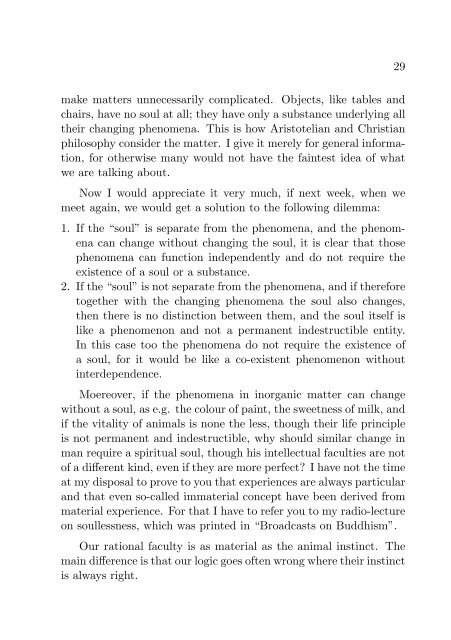Towards the Truth
Notes from a three-day debate in the 1940’s about Buddhism and Christianity.
Notes from a three-day debate in the 1940’s about Buddhism and Christianity.
You also want an ePaper? Increase the reach of your titles
YUMPU automatically turns print PDFs into web optimized ePapers that Google loves.
29<br />
make matters unnecessarily complicated. Objects, like tables and<br />
chairs, have no soul at all; <strong>the</strong>y have only a substance underlying all<br />
<strong>the</strong>ir changing phenomena. This is how Aristotelian and Christian<br />
philosophy consider <strong>the</strong> matter. I give it merely for general information,<br />
for o<strong>the</strong>rwise many would not have <strong>the</strong> faintest idea of what<br />
we are talking about.<br />
Now I would appreciate it very much, if next week, when we<br />
meet again, we would get a solution to <strong>the</strong> following dilemma:<br />
1. If <strong>the</strong> “soul” is separate from <strong>the</strong> phenomena, and <strong>the</strong> phenomena<br />
can change without changing <strong>the</strong> soul, it is clear that those<br />
phenomena can function independently and do not require <strong>the</strong><br />
existence of a soul or a substance.<br />
2. If <strong>the</strong> “soul” is not separate from <strong>the</strong> phenomena, and if <strong>the</strong>refore<br />
toge<strong>the</strong>r with <strong>the</strong> changing phenomena <strong>the</strong> soul also changes,<br />
<strong>the</strong>n <strong>the</strong>re is no distinction between <strong>the</strong>m, and <strong>the</strong> soul itself is<br />
like a phenomenon and not a permanent indestructible entity.<br />
In this case too <strong>the</strong> phenomena do not require <strong>the</strong> existence of<br />
a soul, for it would be like a co-existent phenomenon without<br />
interdependence.<br />
Moereover, if <strong>the</strong> phenomena in inorganic matter can change<br />
without a soul, as e.g. <strong>the</strong> colour of paint, <strong>the</strong> sweetness of milk, and<br />
if <strong>the</strong> vitality of animals is none <strong>the</strong> less, though <strong>the</strong>ir life principle<br />
is not permanent and indestructible, why should similar change in<br />
man require a spiritual soul, though his intellectual faculties are not<br />
of a different kind, even if <strong>the</strong>y are more perfect? I have not <strong>the</strong> time<br />
at my disposal to prove to you that experiences are always particular<br />
and that even so-called immaterial concept have been derived from<br />
material experience. For that I have to refer you to my radio-lecture<br />
on soullessness, which was printed in “Broadcasts on Buddhism”.<br />
Our rational faculty is as material as <strong>the</strong> animal instinct. The<br />
main difference is that our logic goes often wrong where <strong>the</strong>ir instinct<br />
is always right.
















